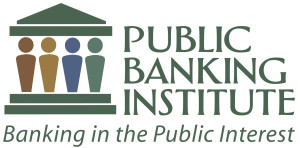PUBLIC BANKING INSTITUTE NEWS: NOV 14, 2019
BREAKING: New Jersey Gov. Phil Murphy orders a task force to set up a public bank
On Wednesday, November 13, NJ Gov. Phil Murphy moved forward on his campaign pledge to create a state-owned bank by signing an executive order for a 14-member “Public Bank Implementation Board.” Tasks assigned to the Board include developing a business plan, consulting with public banking experts, and holding at least three public meetings. The Board must release its plan within a year.
Board members will include at least four members of the public, one of whom will be either Banking on New Jersey Co-Director/PBI Chair Emeritus Walt McRee or Banking on New Jersey Co-Director Joan Bartl. PBI Chair Ellen Brown accompanied Walt and Joan to Murphy’s press conference announcing the Executive Order in Newark. Walt commented:
“This is a practical approach with a clear focus on the financial objectives needed by the State. The Governor is to be congratulated for weathering difficult political pushback in creating a clear path forward for the State Bank.”
[read more]San Francisco sets 2020 timeline to apply for a public bank license
Public bank fever has hit San Francisco City Hall. New legislation introduced on Tuesday, November 12, by Supervisor Sandra Lee Fewer would put San Francisco in line for a public bank license by the end of 2020. The ordinance calls for a new task force to submit a business plan for a city-owned Economic Development Financial Institution (EDFI) by June 2020, with a phase 2 plan for turning the EDFI into a full-fledged depository public bank by December 2020. Journalist Ida Mojadad quotes Supervisor Fewer in the SF Weekly:
“A public bank in San Francisco would allow the city to have more local control, transparency, self-determination, and deepen critical community investments in affordable housing, small business development, loans to low-income households, public infrastructure, renewable energy, and addressing the student debt crisis. San Francisco should lead the pack in this effort, and today’s legislation moves us one step closer to realizing the creation of a public bank.”
[more photos] (Facebook link)[read more]
Ellen Brown: Is it panic or greed on Wall Street?
Why did the Fed just inject $165 billion into the overnight repo market? PBI Chair Ellen Brown, writing in Truthdig, explains that the action was triggered by JPMorgan’s 57% drawdown of cash held on deposit at the Fed. Why? JPMorgan has been propping up its share prices (and bank exec payouts) by diverting federally insured deposits to fund buybacks of its stock. Ellen comments:
“The whole repo rigmarole underscores the sleight of hand on which our money and banking systems are built, and why it is time to change them. Banks do not really have the money they lend. To back their loans, they rely on their ability to borrow from the reserves of other banks, generated from their customers’ deposits. If those banks withhold their deposits in the insatiable pursuit of higher profits, the borrowing banks must turn to the public purse for liquidity. The banks could not function without public support. They should be turned into public utilities, mandated to serve the interests of the people and the productive economy on which the public depends.”
[read more]Hudson Valley, NY journal highlights the promise of public banking
Phillip Pantuso, writing in Hudson Valley’s The River, enumerates the many benefits that are inspiring the expanding grassroots movement for public banking. Since New York City residents are increasingly buying second homes in the region, the story reaches an influential audience in advance of next year’s push for New York’s version of California’s Public Banking Act, NY S 5565. Pantuso concludes:
“[W]hile public banking may have been born of socialism, public banks can help create a more stable and just economy under capitalism, one that centers the concerns of community members over profits, which will be needed to fund projects like the Green New Deal.”
[read more]
